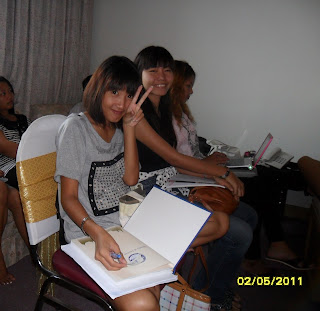SEAT-KU team started preparing for the SOS workshop months earlier. While the integrated survey was still being conducted in February, we already started to identify potential participants to be invited, based on the guidelines in the Deliverable Protocol from UoS. The venue and the dates have already been discussed and agreed upon with the UoS team (Dave, Francis) when we (Kriengkrai, Arlene, Wanwichanee) were in Kochi in January. We knew that we needed to start the preparations sooner due to the various project activities going on and coming, as all work have to be coordinated and managed accordingly. The SOS workshop is an important part of the project especially for us local partners, wherein we have to be fully involved in all aspects.
A list of potential participants was drawn up together with spare invitees. These came from our network of contacts along the value chain, as well as from the existing list of key informants and survey respondents of the SEAT project. As the SOS workshop is a local meeting in Chanthaburi, the participants have to be from the local area as much as possible esp the shrimp producers and other local stakeholders. However, since the project is working on both shrimp and tilapia, we also invited representatives of our respondents in nearby Chachoengsao to represent the tilapia producers.
In addition, the main logistics involved which was the actual venue, in this case a conference room, had also to be booked in advance. So we identified the venue of the workshop to be in a local hotel and preliminary contacts were made as early as March to secure booking of rooms and meeting rooms. Subsequent contacts were made later on in person and through email, phone and fax for further confirmations.
Actual invitations were posted in April after the long Thai new year holiday, and 3 main confirmations were made to the invitees during the weeks until the day prior to the workshop. First confirmation was to ensure they have received the invitations and to ask about their acceptance. Second was to follow-up on confirmations and to invite other replacements. And third (during the 2 days prior to the workshop) to remind those attending of the workshop date and time.
Logistical as well as technical preparations were also done simultaneously. Logistics involved confirmations of bookings for hotel, vehicles, and related matters; staffing and staff orientation for the workshop proper; and materials preparation.
Technical preparations involved the finalising the programme and contents of the workshop, analysis of survey data and extracting major highlights to formulate questions for focus group activities, preparing materials for the exercises, and preparing various presentations from project information to project results. All materials in English were translated into Thai.
A skeletal staff was working in the office on the SOS workshop while the rest of the Thai team were in the field for the WP5&WP8 field work during the month of April & May. The week prior to the SOS workshop, there were only 3 working days due to the Thai holidays, so it was good that we started our preparations well in advance. Since the team was leaving for Chanthaburi on Sunday 22 May, we held an SOS workshop orientation for staff on 20 May, a Friday. We gave a briefing about the SOS workshop and what are the detailed activities to be done. Esp. important was the intensive facilitation and documentation during the focus group activities. And we informed everybody that we have to be flexible and ready for any changes that will be made during the preparation days and the actual SOS workshop.
The two days 23-24 May in Chanthaburi were hectic and intensive as the SEAT-KU team met with the U of Stirling team who are coordinators of the project. We were joined also by the PI of the U of Bergen and a representative each of the Asian partners, namely from Bangladesh Agricultural University, Cantho University and the Shanghai Ocean University. So there were 20 of us all in all, working together, even late into the night until the early morning hours to finalise preparations for the 25 May SOS workshop.
Thanks to everybody for all the help and support you have provided.
























































